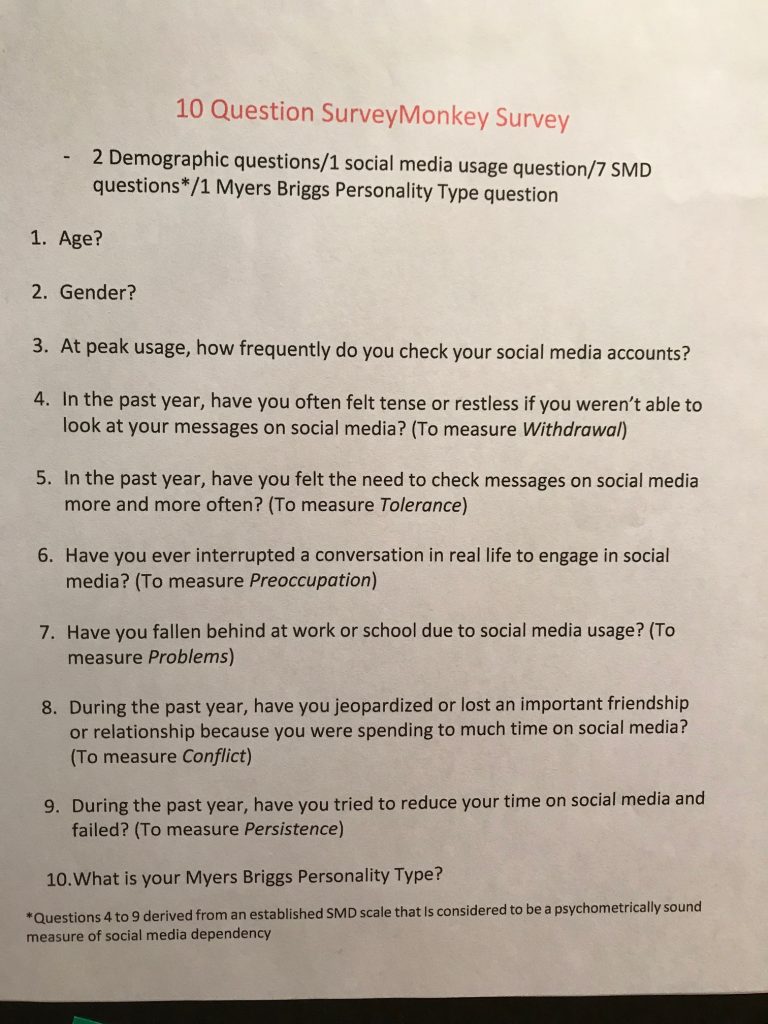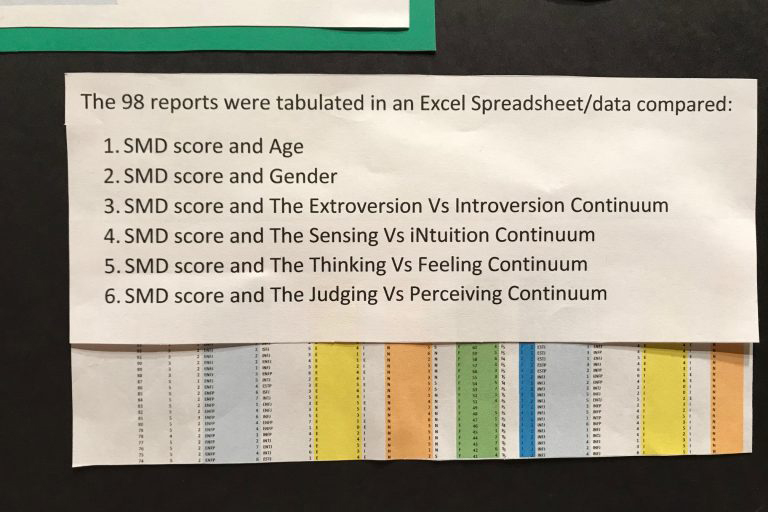My kid is going through the Science Fair years. In the past, he’s done projects on his family history, on friction effects and probably several I’m forgetting.
This year he tackled a hot-button topic. He decided to test whether social media dependency could be predicted by knowing a person’s Myers-Briggs personality type.
I say “hot-button” because when I posted to Facebook soliciting friends to complete the survey, responses way exceeded expectations. And a lot of people expressed interest in seeing the results.
My son presented his own results at his school. But here is a summary for all those of you who participated or are just curious.
First off, the survey itself was designed to elicit base information (age, gender, personality type), as well as assess social media use against a metric used in clinical practice to diagnose Social Media Disorder (SMD). That clinical metric tests for the following:
- frequency of social media usage
- symptoms of withdrawal after cessation of use
- tolerance changes over time
- evidence of preoccupation with one or more social media
- life problems arising from social media usage
- personal conflict stemming from social media interactions
- the level of social media’s “persistence”, which refers to the level of difficulty a user experiences in trying to limit use
The full SMD checklist measures for variables beyond these seven. But Survey Monkey limits you to 10 questions before they charge you a big fee. So we had imposed restrictions as do most scientific research projects
The survey in the end looked like this:

Questions 1, 2 and 10 measure the base information. Questions 3 to 9 represented our proxy measure of SMD. A yes scored one. And depending on usage levels cited in response to Question 3, 0-2 points might be indicated. That resulted in possible SMD scores from zero to eight.
Once the word was out there, we had a tremendous response. Over 100 people took the survey, though again Survey Monkey free use restrictions kicked in. They only let you compile the results of 100 before you have to pay. So we chose 100 randomly, of which 2 were incomplete, giving us a final data set of 98, which allowed something like 95% confidence in the results. (Hey, I dropped out of stats, ask my kid any of the technical questions.)
I know that anybody reading this really only wants to know one thing, which is: does my personality type mean I’m a Facebook junkie or not!!??
So this is me, cutting to the chase.
Here are the results by personality type, noting the number of respondents who identified by the different Myers-Briggs archetypes.

So what do you know, our lone INTP, referred to in the typology as “The Thinker” returned the highest SMD score. So they either show the highest signs of dependence, or perhaps they were merely the most honest respondent.
And then of course, next one down is another small grouping, only .5 lower on the SMD scale who appear to be an almost completely opposite personality type. So what does that mean?
Notably, there was a clustering of 27 respondents who shared continuum positions oriented to Intuition (N), Feelings (F) and Perceiving (P).
Here’s another look at the way the continuum stacked up against one another:

My relative ineptitude with Excel graphing means those numbers at the bottom are listed kinda wonky. Just match up the colours: numbers to descriptors to bars and everything makes sense.
In words:
Introvert SMD scores were on average higher than extroverts. This result ran counter to hypothesis. We thought those highly social E types would be the more susceptible to social obsession. But those inward looking I’s proved just slightly more vulnerable.
On the continuum from Sensing to iNtuition meanwhile – used as an indicator of the way one focusses one’s attention – check out those scores. Apparently if you like to learn by association and brilliant flourishes of insight founded on pattern recognition, well then you also are glued to Twitter just a degree more than those who respond to their senses and to the neatly sequential.
The last two are clearly where the difference stand out though. The Thinking-Feeling continuum is associated with the way people make decisions. Objectivity versus subjectivity, roughly. And here perhaps the data is least surprising. Because despite our highest SMD score going to a T, the F’s had it by a long shot in the end. So note, if you make your decisions through personalization and with reference to experience and people don’t like your cat video, you hurt more deeply than all the thinkers on earth.
Last one: Judging versus Perceiving, a continuum measuring a person’s response to complexity, which is (best I can make out) a matter of preferring organized, structured data with a bid to closure (J), and those more prone to the stimulating, new and potentially random idea (P). And again with emphasis, we had a winner. SMD scores were significantly higher for our perceivers, indicating perhaps that the new idea of a that new cat video is more intoxicating to them.
Those results considered, the INFP personality type that the data indicated was most susceptible to SMD. Quiet, reflective folks interested in serving humanity, say the experts. Extremely loyal with well developed value systems in which they strive to live.
Princess Diana, Audrey Hepburn, Fred Rogers, John Lennon, Kurt Cobain, Tori Amos, Morrissey, Chloe Sevigny, A.A. Milne, Helen Keller, Carl Rogers, and Isabel Briggs Myers herself who created this whole metric in the first place.
The creator of Myers Briggs would have been your friend on Facebook. And yours. And yours. And yours.
Some final numbers and thanks to all who participated:


